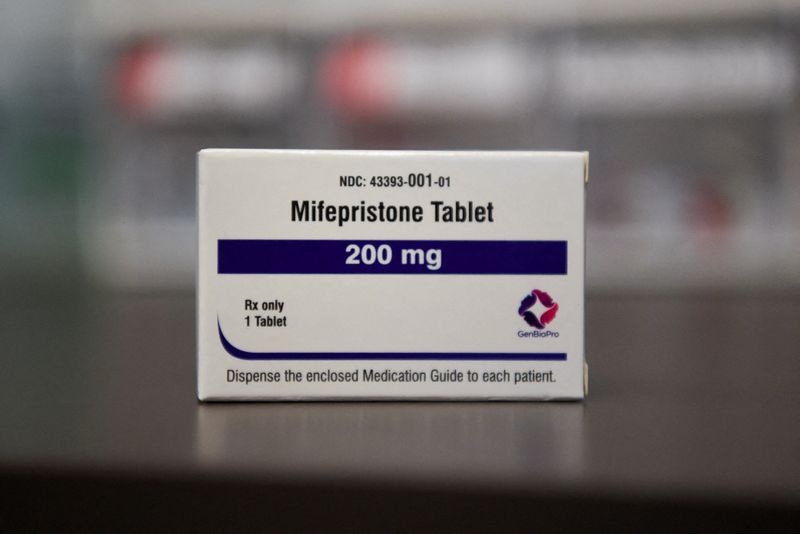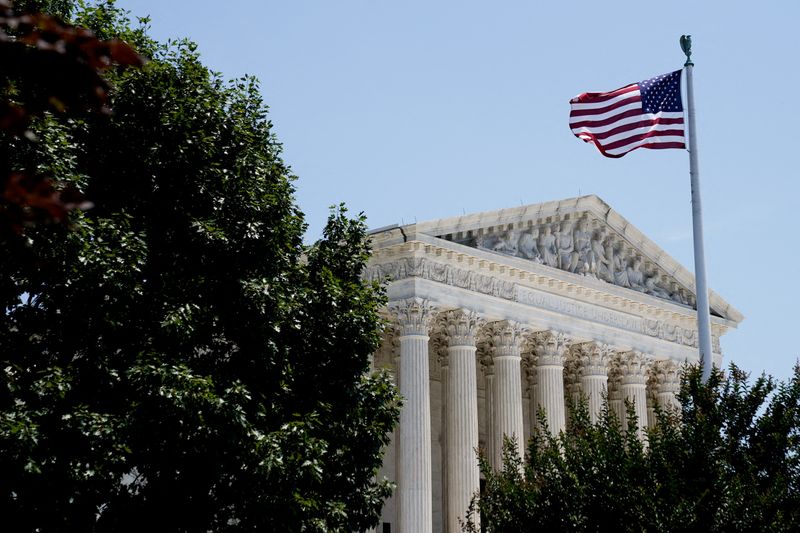By Andrew Chung
WASHINGTON (Reuters) -U.S. Supreme Court Justice Samuel Alito on Wednesday extended by two days a temporary block on limits set by lower courts on access to the abortion pill mifepristone in a challenge by anti-abortion groups to the drug's federal regulatory approval.
The decision to keep the matter on hold gives the justices a bit more time to consider requests by President Joe Biden's administration and the pill's manufacturer Danco Laboratories to block an April 7 preliminary injunction issued by U.S. District Judge Matthew Kacsmaryk in Texas that would greatly limit the availability of mifepristone while the litigation proceeds.
Alito's order extended the pause on the dispute until Friday at 11:59 p.m. EDT (0359 GMT on Saturday). He had previously halted the lower court rulings until the end of Wednesday.
The Supreme Court has a 6-3 conservative majority.
The administration is seeking to defend mifepristone in the face of mounting abortion bans and restrictions enacted by Republican-led states since the Supreme Court in June 2022 overturned the landmark 1973 Roe v. Wade decision that had legalized the procedure nationwide. Alito authored that ruling.
The White House is prepared for a long legal fight on the issue, Press Secretary Karine Jean-Pierre told reporters.
"We're clearly keeping a close eye on this. ... We are prepared for any outcome the Supreme Court may issue," Jean-Pierre said.
The Food and Drug Administration (FDA), the U.S. agency that signs off on the safety of food products, drugs and medical devices, approved mifepristone in 2000. The current case could undercut federal regulatory authority over drug safety.
"We will continue to stand with FDA's evidence-based approval of mifepristone," Jean-Pierre added. "... And we will continue to support FDA's independent expert authority to review, approve and regulate a wide range of prescription drugs."
Mifepristone is used in combination with another drug called misoprostol to perform medication abortions, which account for more than half of all U.S. abortions.
The administration and Danco told the justices in their filings that mifepristone might not be available for months if the restrictions were allowed to take effect.
The New Orleans-based 5th U.S. Circuit Court of Appeals on April 12 declined to block the curbs ordered by Kacsmaryk. The 5th Circuit did halt a part of Kacsmaryk's order that would have suspended the FDA approval of the drug and effectively pull it off the market.
The restrictions, if enacted, would roll back actions taken by the FDA in recent years to make it easier to access mifepristone after confirming the pill's safety and efficacy.
Those actions include in 2021 allowing mifepristone to be distributed by mail, and in 2016 approving its use up to 10 weeks of pregnancy instead of seven weeks, reducing the dosage required and cutting the number of in-person doctor visits from three to one.
Current drug labels for mifepristone would have to be adjusted to account for the restored limits on its use, a process that the Justice Department and Danco previously said could last months, complicating access to the pill.
The restrictions would also suspend the approval of the pill's generic version made by GenBioPro Inc, which accounts for two-thirds of the mifepristone used in the United States for medication abortions.
Nevada-based GenBioPro on Wednesday filed a lawsuit naming the FDA as a defendant seeking to ensure that it can continue selling its pill amid the ongoing legal challenges. GenBioPro named the FDA as a defendant so that it can ask a court to order the agency to keep the drug on the market.

Reuters/Ipsos public opinion polling shows little support for recent steps to further restrict abortion access.
A majority of Americans - some 68%, including 46% of Republicans - oppose Kacsmaryk's decision overturning FDA approval of mifepristone. Some 56% of respondents said they have an unfavorable view of the Supreme Court.
